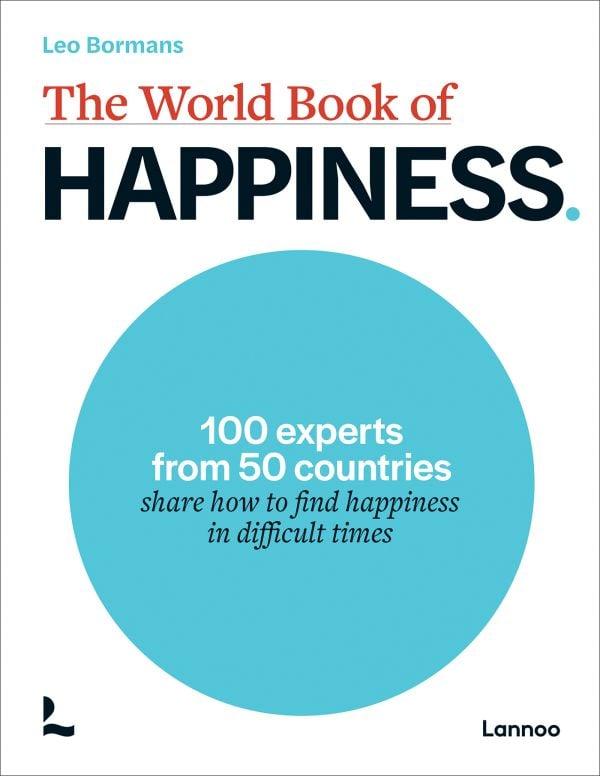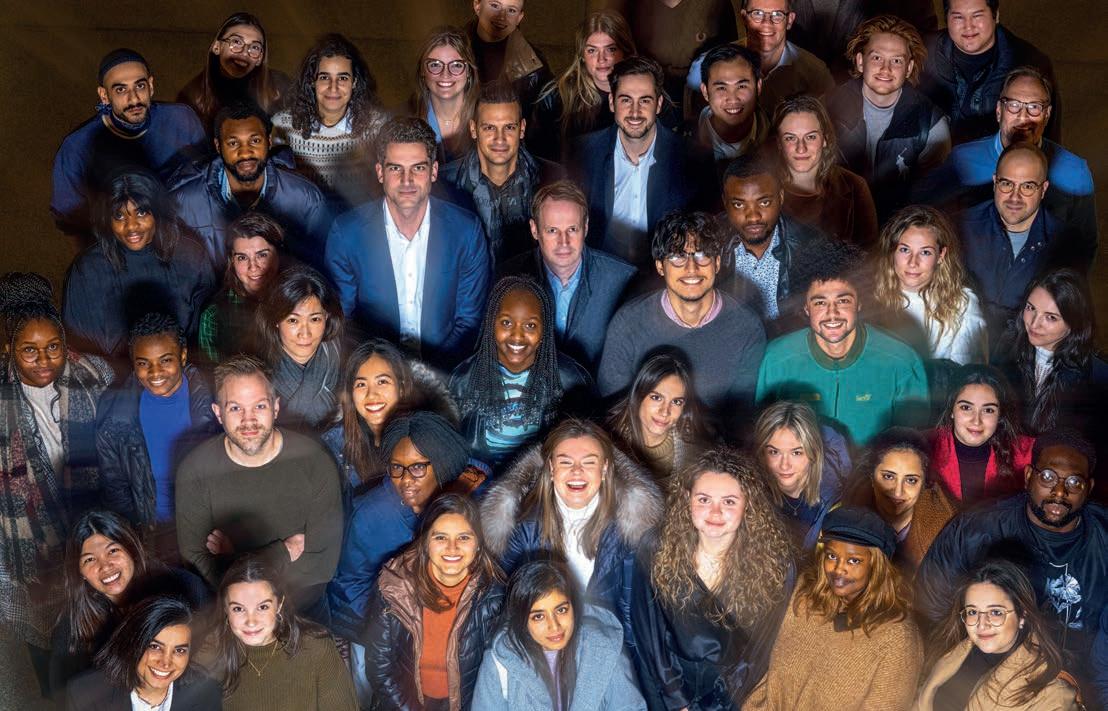
Countries with a * do not have survey
Ranking of Happiness based on a three year average 2020-2022
Source: World Happiness Report United Nations 2023
Later is too late.




Countries with a * do not have survey
Ranking of Happiness based on a three year average 2020-2022
Source: World Happiness Report United Nations 2023


‘Movement is the natural state of man. Set goals, make plans, work for them, and happiness will follow,’ says statistician and psychometrician András Vargha. ‘If the foundations of the house are weak, the house will collapse. Strengthen the foundations of your mental health and you will be stable and happy.’
Mental health has five main pillars. It’s encouraging to know that these components of mental health can be trained, improved, and strengthened. If they function well, you have five foundational elements for your health and happiness.
This most important pillar enables you to cope with the difficulties you encounter by mobilising various competencies in difficult, stressful, and challenging situations. It helps you to provide successful individual and social problem-solving behaviour.
This pillar comprises mental capacities and resources that can be mobilised when you face unexpected, stressful, and difficult situations. The higher your level of resilience, the faster you can recover from a sudden, unexpected stressful situation. An ability to
THE INSIGHT The world is a gigantic, complex system, and we are just tiny specks in it. We will only be happy if we find our place in this system, and work effectively for its well-being.
THE ESSENCE Stop looking for your own happiness: instead, actively seek the happiness of others, and you will find your own. To be able to do this, you must train yourself in a variety of ways.
get ‘in flow’, enjoy meaningful life goals, have few negative emotional states, and satisfaction with life, contribute to a higher level of resilience.
This capacity helps you to mentally mobilise your previous positive, joyful memories and experiences to generate mental well-being, reliving them in the present and extending them to future events.
This power helps you to regulate and control emotions, temperament, and negative states.
Well-being is a positive state that is experienced when the other pillars of mental health are working well. But you can also directly improve your wellbeing. It comprises four components: biological, psychological, social, and spiritual.
If the foundations of the house are weak, the house will collapse.

The world that surrounds us is a huge and complex force field. We must learn to move in it for our own good and the good of those around us.
1. Want to be happy, want to feel better. If you have the will, do something for your happiness. First, do something to improve, to strengthen your mental health.
2. Look around to see who and what you can help. Helping others to be happy will make you happier.
3. Support the weak and the disabled; be tolerant of otherness. Be open to the good and the beautiful.
4. It is enough to do useful things with your skills, your strength, and your time. In the meantime, you will find out what you need to improve and strengthen to be better and more useful.
5. But you don’t have to achieve everything in a day. You just need to take one step forward every day. Sometimes it is enough to celebrate with others.
6. Don’t stress about getting something wrong. There are many paths to happiness.
András Vargha has been Secretary General of the Hungarian Psychological Association. He is Professor Emeritus at Károli Gáspár University of the Reformed Church in Budapest (Hungary) and Professor Emeritus at Eötvös Loránd University in Budapest. He has contributed to the development of the Mental Health Test, several new nonparametric statistical methods, and statistical softwares.
‘Happiness is a by-product of making others happy, especially the significant people around you who in return have the capacity to influence your state of being,’ says Charlie Azzopardi, who is the Chair of the Institute of Family Therapy in Malta and has been working with unhappy couples and families for almost 30 years. The crucial questions you can ask yourself are: ‘How am I not managing to make him/her make me happy so that he/she can make me happy in return?’ and ‘What can I do differently to make him/her make me happy?’
The couples therapy space is a continuous teaching place for us clinicians. In our work with children, couples, and families we make a lot of beautiful discoveries. Such discoveries are often representations of different realities people create through the language adopted in their families. We have been working with unhappy couples and families for almost 30 years and learned that happiness is the ultimate goal of many. So how do people fail to achieve it?
The single most common error people in intimate close relationships make is that they expect to be made happy by others around them, particularly by one’s intimate partner. In itself, this is an admission that happiness is reciprocal and that they are dependent on others for it. “I want to be happy, and
THE INSIGHT Happiness is a relational phenomenon and is found and expressed in human relationships using neurochemical pathways to mediate. Stimulating these neurochemical pathways in other people proves easier than stimulating them in ourselves. As demonstrated by Bastiaansen, Thioux & Keysers, stimulating happiness in others in return stimulates our happiness through the activation of mirror neurones. Reciprocity is about influencing others who influence us in return and whom we continue to influence in a circular fashion. So next time you want to be happy try starting by making someone else happy first. Reciprocity is the root of happiness and all human emotion.
THE ESSENCE Happiness, like all emotions, is a reciprocal phenomenon and occurs in relationships, whether physical or imaginary.
you are not making me happy,” “My family makes me happy” or “If you want to make me happy you have to stop doing this or start doing that.”
What people often miss is that for others to make them happy others have to feel happy too. Starting the cycle of happiness, therefore, is a personal choice to influence others around me towards happiness. I can make you happy anytime and anywhere as long as I stop focusing on myself and start thinking of ways to make you happy. Succeeding at making you happy makes me happy. Making other people happy seems to be the most happiness-generating experience. It is rather simple. I keep my wife happy so that I am surrounded by happy and optimistic people who in return make me happy so that I can make them happy and so on.
Making other people happy seems to be the most happiness-generating experience.

People from different walks of life complain that they are unhappy in their marriage or relationship. Throughout my many years of professional practice, I have observed that partners expect their spouses or partners to make them happy. Most of all they expect that their partners should know exactly how to make them happy. Such expectations typically intensify the more they go unfulfilled, eventually destroying a relationship. These sorts of expectations reflect one’s encapsulation in one’s expectations and therefore one’s sense of loneliness and detachment from one’s partner. I often respond by generating circular questions, as I learned a long time ago from Selvini Palazzoli and others, to stimulate the client’s capacity to empathise with their partner. “What makes you
think the other person is so powerful that he or she can make you or break you?” and “What do you actually do to make your partner happy?”
The answers often reveal a linguistic relationship to other constructs and myths held by the person around how relationships ‘should’ work. For example, ‘polarisation’: the idea that if one is right the other is wrong by default and that things are either good or bad, high, or low. In fact, people can be both right or both wrong, or both right and wrong at the same time. People believe in the construct of ‘normal’, and assume there’s a standard that we can conform to, to achieve happiness and quality of life. These and other myths are typically unconscious but can be easily observed in language.
to my wise, hard-working mother, who fought for her children, providing us with the best she could. She became a woman with far more wisdom, resources, and resilience than she herself could ever anticipate or understand.
Through my dear siblings, I learned about a life that was not otherwise possible. I would not be me without my family, friends, my childhood librarian, team fellows in sports, people in congregation with gentle gospel, my many teachers and students, coworkers, and patients. All of us need support to grow, but also enough courage to walk ahead.
Happiness, life satisfaction, resilience and peace of mind are indicators of good mental health. My research focus has been on life satisfaction measured by interest, happiness and easiness in life and perceived loneliness. It revealed the accumulation of advantages and disadvantages over the life course both in general and in patient populations. Life dissatisfaction predicted severe long-term health adversities (e.g., mortality, morbidity, disability) and life satisfaction predicted long-term well-being and many benefits regardless of baseline health status.
Through clinical work, I learnt that alleviating suffering needs knowledge, time, resources, persistence, and truthfulness. We are far from equal in respect of our start in life, and how we grow and age. The fear of everything that is different from us, should also be tamed since it can lead to the harshness of mankind, which can reflect the lack of coping abilities.
The best teachers about life and happiness are the present time, our own history and that of mankind. As Sigmund Freud (°1856) wrote, “We must accept that there are inevitable sources of non-happiness in life. Yet we must not – indeed, we cannot –give up our efforts to bring happiness nearer to fulfilment by some means or other.” According to John Stuart Mill (°1806), the greatest pleasure in life is ultimately found in “those who leave behind objects of personal affection, and especially in those who have fostered a compassionate interest in the com-
mon affairs of mankind. Even on the threshold of death, they are as keenly interested in life as they are when being young and healthy.”
And psychoanalyst Donald Winnicott (°1896) wrote in his end-of-life notebook: “Oh God! May I be alive when I die.” Even if we cannot anticipate how it will be, truthfulness to oneself – not the illusion of happiness – creates happiness. Ancient sceptics emphasised giving up plans and walking creatively in paths suitable for themselves, which leads to flourishing without striving for success.
Repeating sufferings in each generation could be prevented by learning from our own history and the history of mankind, but not without wide political awareness and responsibility.
1. Show gratitude and compassion to others in everyday life.
2. Nurture the prerequisites for good mental health: healthy relationships, physical well-being, and a good way of living. Take care of yourself but seek also help when needed.
3. In Western countries, workers in primary care and schools are crucial in early detecting poor mental health but not without mental health education and robust support.
4. In developing countries, basic needs and early support given to women and children, and education to families, and villages are crucial for increasing happiness.
5. To increase research knowledge, more collaboration and education over the disciplines can be increased by remote connections.
6. Be curious. You can always learn from the stories, the courage and the dreams of your family, friends, compatriots and … humanity.
Heli Koivumaa-Honkanen is professor emerita in Psychiatry, at the School of Medicine, University of Eastern Finland in Kuopio, Finland, with special competencies in psychotherapy and social psychiatry.
Only by collaboration we can enjoy and multiply the gained wisdom, understanding and possibilities to change the future.
‘Think globally, act locally,’ says Dr Kamlesh Singh, one of the leading voices in positive psychology in India. ‘Within the context of happiness research, this implies integrating global and local perspectives through a topdown approach – one in which we can examine happiness-enhancing strategies on a global scale and adapt them to local cultures. Simultaneously, highlight the positive practices in the local community through a bottom-up approach.’
THE INSIGHT Happiness is largely viewed as a complex and multifaceted construct due to the multitude of meanings attached to it across different cultures. Over time there has been an increasing emphasis on a more nuanced and culturally rooted understanding of happiness. Exploring happiness from a cultural lens and an indigenous perspective has brought to light the importance of low arousal positive emotions such as harmony, inner peace, and contentment in Asian cultures, such as India. Currently, there is a recognition that the ‘world within’ is of immense significance in these cultures and plays a pivotal role in determining their happiness levels.
THE ESSENCE Individuals in collectivistic cultures have a more socially-oriented view of happiness. Hence, it is unlikely that addressing happiness at the individual level will yield significant positive outcomes in such cultures. Addressing socio-cultural determinants of happiness and cultural re-engineering may be more effective in enhancing overall well-being and happiness levels.
Research conducted in India has shed light on certain factors that impede well-being – namely, perceived gender discrimination, malnutrition, unsafe environment, socio-cultural expectations, and poor health of self and family members. Religious and spiritual practices native to a particular culture may provide sustainable ways to maintain or enhance happiness, interpersonal relations and character strengths. Prospective and retrospective observational studies are valuable for conducting research of this nature. Yoga, meditation, nature walks, singing religious and spiritual songs, concepts such as forgiveness, compassion, promoting non-violence, helping others and gratitude are indeed a core part of
religious and spiritual practices across several cultures.
Research has indicated the role of happiness-promoting factors – the most interesting among which is the positive association of certain religious practices with well-being. One such practice is Satsang which includes singing religious/spiritual folk songs in group settings. It has been found to foster a sense of belongingness, reduce stress levels, and enhance the well-being levels of the participants. Thus, it might be worth exploring and investigating the happiness-increasing potential of culturally rooted reli-
The ‘world within’ plays a pivotal role in determining happiness.

gious and spiritual activities. It could also help such societies navigate socio-cultural evils including female foeticide, gender discrimination, alcoholism, violence, and road rage to name a few.
Happiness is both a personal and national goal, and the key to happiness lies not only at the individual level but also in socio-cultural factors. Hence, researchers need to incorporate both individual and socio-culturally oriented factors as part of happinesspromoting interventions.
1. Identify and embrace your personal and social happy habits.
2. Make conscious efforts to practice them every day.
3. Support existing religious and spiritual groups and communities that mostly incorporate underlying positive psychological practices including forgiveness, compassion, and gratitude.
4. Researchers and policymakers need to develop a nuanced and socio-culturally rooted understanding of happiness. This will help them identify the existing practices that could be impacting the happiness levels of that community.
5. It might also be worth exploring indigenous knowledge systems as they usually contain a wealth of information and knowledge that might be more relevant and effective in enhancing health and happiness in different cultures.
Kamlesh Singh is a Professor of Psychology at the Department of Humanities & Social Sciences, Indian Institute of Technology Delhi. She initiated the Indian Association of Positive Psychology and has published two (co-authored) books, 20 book chapters and over 100 research papers in peer-reviewed national and international journals. She was the recipient of the prestigious ‘Shane J. Lopez Award for Professional Contributions in Positive Psychology’ in recognition of her outstanding contributions to the field of positive psychology by the Section on Positive Psychology, American Psychology Association
‘Recoupling material prosperity, social cohesion and environmental responsibility requires realigning both government and business goals,’ says economist Marc Fleurbaey. How can we make the shift from wealth to well-being, at both the individual and policy level? Social responsibility is not an option, it is imperative.
We are living in a crucial historical era. In the primary goals of individuals and policymakers, well-being is replacing the pursuit of wealth. But the transition is slow and haphazard, and there is some pushback from various quarters. Importantly, the goals of both public and private actors must be reoriented towards human well-being.
This calls for rejecting prevalent assumptions. The first is the idea that the economy has its own laws and that its performance can be studied independently of the broader social and environmental context in which it operates. Second, there is the idea that “greed is good”, that the selfish pursuit of material gain produces greater social gains. Both ideas couldn’t be more wrong. The economy interacts closely, and increasingly dramatically, with our social life and with the environment. An apparently efficient economic system can be socially and environmentally unsustainable. And, given the extreme interdependence of all of System Earth’s components, aggressively extractive behaviour is ruining society and the environment.
Social responsibility is not an option, it is imperative.
THE INSIGHT Our economic and social life is still dominated by the Gross Domestic Product (GDP)-shareholder value nexus, but we are slowly transitioning to a new nexus based on well-being and stakeholder value.
THE ESSENCE Our economic life is part and parcel of our greater social life, and all economic objectives and indicators must be redefined in terms of contributions to human flourishing.
We must put well-being at the centre of our concerns at both the collective and individual levels. But this is easier said than done. The good news is that a new nexus is emerging, which can provide good guidance: the well-being-stakeholder-value nexus. Transitioning from a GDP focus to a well-being focus means primarily two things at the collective level. First, it is crucial to include many dimensions of quality of life that go beyond income and wealth. A good work-life balance and the quality of social relationships, in particular, have a significant impact on quality of life. Second, it is not just the total amount of well-being that matters, but also how it is distributed among the members of the population.
A focus on shareholder value is no longer acceptable at the business level because businesses create value for a larger set of stakeholders: customers, employees, suppliers, and a broader circle of stakeholders involving communities, future generations, and ecosystems. Pursuing stakeholder value rather than shareholder value should ultimately become compulsory rather than simply an option for the virtuous few.
Recent research brings two pieces of good news in this regard. First, the pursuit of stakeholder value is more than a smart catchphrase; it can be done sys-
tematically by a responsible form of profit-seeking management, one that refrains from exercising market power, allows for inclusive governance and collective bargaining, and incorporates the benefits and costs of business activities for society as a whole into the profitability calculus. Second, the decentralised pursuit of stakeholder value is largely aligned with the pursuit of well-being at the collective level. This means that, under these specific conditions, the market economy can remain the bedrock for economic activities in this transition to the new nexus. Would such a realignment of goals suffice to bring about universal happiness? Of course not, but it would make a tremendous contribution. Other issues to be addressed involve moving away from a materialistic view of achievement which leads us to overinvest our attention and energy in activities that disturb ecosystems and reorient our goals in life towards cultural and social achievements – specifically, fully embracing the notion that what matters most is how we relate to each other. This is not merely a moral injunction, it is based on the observation that human beings thrive when they are mutually supportive and that norms and institutions that pit them against one another are extremely wasteful in terms of human potential.
What we are moving towards is a life and society that puts greater emphasis on inclusion, quality, and relations – in a multifaceted way and with solid economic foundations.
1. Focus on building meaningful relationships with those around you.
2. Respect and appreciate the unique needs of each individual you interact with, and strive to create an environment of mutual understanding and collaboration.
3. Promote a vision of life success based on immaterial achievements and high-quality social relations.

4. At the business level: explicitly adopt the stakeholder value approach. Pursue stakeholder value by responsible profit making, with inclusive governance and considering all external benefits and costs imposed by business activities on the broader society and the environment.
5. At the collective level: redefine collective goals in terms of promoting well-being.
6. In the promotion of well-being, be inclusive toward disadvantaged populations and adopt a comprehensive notion of quality of life.
Marc Fleurbaey is a Professor at the Paris School of Economics in France, a researcher at the French National Centre for Scientific Research (CNRS) and an associate professor at Ecole Normale Supérieure (ENS) – Paris Sciences et Lettres University (PSL). He has been contributing to the Intergovernmental Panel on Climate Change and is a founder of the International Panel on Social Progress. Marc Fleurbaey is the lead author of the Manifesto for Social Progress, the co-author (with Didier Blanchet) of Beyond GDP and (with François Maniquet) of A Theory of Fairness and Social Welfare
‘The average human spends roughly 79 years or 28,835 days on Earth. The question is, are we spending our days the way we want to spend our life,’ asks Pninit Russo-Netzer, who offers a compass for meaning in life. ‘For many of us, we are not “consciously choosing” how we spend our time, how we use our energy and how we purposefully interact with others.’
Various studies have suggested the paradoxical effect that the more individuals value happiness and pursuit it for its own sake, the less likely they will be able to actually attain it. This is due to placing excessive value on happiness and setting unrealistically high standards for happiness that may cause fear of not measuring up to all these expectations. Such an evaluative rather than engaged mindset involves constant personal monitoring that appears to impede enjoyment. Albert Camus once said, ‘Life is a sum of all your choices,’ and Annie Dillard adds, ‘How we spend our days is, of course, how we spend our lives.’
Investing in meaningful experiences and consciously choosing how to use our time is an alternative and more effective way to enhance well-being than overemphasising the pursuit of happiness. This is especially important given phenomena such as “hedonic adaptation”, which is the tendency to habituate to positive (and negative) life circumstances and expe-
THE INSIGHT Rather than over-emphasising the pursuit of happiness, making conscious choices about how to organise our day-to-day lives can maximise our well-being: When we plan our days, we can choose to schedule activities that are in congruence with the things that matter to us, that hold import and value for us.
THE ESSENCE We build our happiness and well-being through our choices and the things we repeatedly do every day; it doesn’t just happen to us.
riences, and “inattentional blindness”, which occurs when we fail to notice an unexpected yet visible stimulus and instead act on what can be considered autopilot.
Mounting empirical research in recent decades indicates the centrality of meaning in life to human experience and to human flourishing and happiness, as well as a coping mechanism for adjustment to life’s adversities. Yet, while meaning potentials exist at each and every moment of our lives, there must be an increased awareness that most often arises when we are mindful and actively attend to them.
Experiencing meaning in life is a concrete question that has everything to do with our priorities, with how we spend our time—at work or at play, with others or alone, in competition or in service. In other words, meaning cannot be “given” or prescribed but rather must be discovered through an active, dynamic, and unfolding process of exploration, reflection, and engagement with the world.
Life is a sum of all our day-to-day choices.

My research shows that people who prioritise meaning through their actions tend to have a greater sense of meaning in life, and in turn, they experience less negative emotion and more positive emotion, gratitude, coherence (a sense of optimism and control), happiness, and life satisfaction. In addition, people who are searching for meaning have a higher sense of meaning and well-being when they are actually prioritising meaning in their daily lives. That means that if we’re wishing for a more meaningful life but not actively doing anything about
it, we probably won’t fare very well. Rather than hoping we will discover or figure out the meaning of our lives someday in the future, it may be possible for us to take ownership of cultivating and experiencing a meaningful life on a day-to-day basis.
In a world of high intensity, cynicism, and increasing productivity demands, knowing what matters to us and thinking about the “why” we do what we do is important. Pausing the rat race and allowing yourself to mindfully pay attention to your meaningful moments, dreams, and wishes is vital in calibrating your compass.
‘Reality can change in no time,’ declares Professor Shahe Kazarian, who recently had to leave Lebanon due to unbearable living conditions and a lack of vital medications. In 2021 the country still scored 5.2 on the United Nations’ happiness scale. Two years later it is the second worst in the world: 2.4, just above Afghanistan and lower than Sierra Leone (3.1), Zimbabwe (3.2), Congo (3.2) or Botswana (3.4). How did a country once dubbed the Switzerland and Paris of the Middle East get into such a deep crisis?
Despite its chequered history and unsettling political landscape, Lebanon was considered the most prosperous country in the Arab world and the regional centre for tourism, trade, finance, health care, freedom of the press, and openness to the world. And happiness was in the genes of the Lebanese people, a collectivist bunch full of zest and social engagement driven by hedonic and eudaimonic informed “national duties” that include wishing others naharak said (have a day filled with happiness); savouring traditional Lebanese cuisine and ahla sahra (the best evening social gathering in a home or a nightclub); falling in love with other countries through travel and shopping; and pursuing a purposeful life journey of culture, art, creativity, and individual initiative.
The first World Happiness Report published in 2012 ranked Lebanon 92nd in happiness among 156 nations, a position that showed little fluctuation in
THE INSIGHT A “Failed State” is toxic to the happiness of its citizens.
THE ESSENCE The toxic effect of a “Failed State” on happiness challenges the assumption that individuals are responsible for their own misery. Governments are responsible for strong and functional states that provide for citizens’ basic needs and rights, and for formulating and evaluating public policies that impact positively on people’s happiness.
World Happiness Reports over the next seven years. However, Lebanon’s happiness ratings have plummeted since 2019, and it currently ranks as the world’s second unhappiest country.
Lebanon’s shocking metamorphosis from a “fountain of happiness” to a “hell on earth” didn’t happen by chance. In early 2019, the country began its descent into an economic and financial crisis that prompted the World Bank to describe the situation as one of the worst in 150 years. The country’s crumbling economy and downwardly spiralling currency wiped out people’s life savings forcing four out of five people into poverty; plunged the nation into an unprecedented shortage of goods and services, and soaring prices; damaged mental health, driving some to suicide and even self-immolation, and caused waves of mass migration of highly skilled professionals and youth. Two factors aggravated the country’s economic and financial crisis: the lockdown measures of the COVID-19 pandemic beginning in 2020,
Never take the freedom and the life you have, either as an individual or a society, for granted.


and the negligent ammonium nitrate explosion of the Port of Beirut on August 4, 2020, that left more than 200 people dead, 4,000 people injured and 300,000 people homeless.
My wife and I moved to Lebanon in 2001 for altruistic reasons and while from 2001 to 2018 we survived plenty of trauma and turmoil and even danger to our lives, we also enjoyed a good life through academia, involvement in the international women’s social support group, travel, and philanthropy in the form of sponsoring the construction of a new school in the Bourj Hammoud neighbourhood and providing financial support for arts and culture, and for the education of disadvantaged students.
In 2019, however, life in Lebanon fell into chaos, a hellish abyss unparalleled in its history. We wit-
nessed the heartbreaking pain and suffering of the people and lived through the hardship and humiliating conditions the economic meltdown brought us through no fault of our own: struggling daily with shortages of food, electricity, internet, and water; haggling with the hyperinflation of the available goods and services; begging the disgruntled staff of the hard-to-access banks to allow us to withdraw sufficient spending money from our savings; dreading long queues for bread and fuel for our car, and hopping from one empty pharmacy to another in search of life-saving medicines for hypertension and diabetes. Nevertheless, if a comedy show or musical was being staged, we went whenever we could as a way to maintain what Dana Hourani described as, “A sense of aliveness in a country that feels constantly dead!”
Locally and internationally, Lebanon came to be labelled a “Failed State”. Indicators that supported the view of “a corrupt, venal, and patronage-based sectarian power-sharing political system” that functioned without accountability; that allowed decadeslong mismanagement and squandering of national wealth; and that supported the impunity of a sectarian “state within a state” political structure including the illicit transportation of drugs, weapons, and explosives across neighbouring Syria; smuggling “billions of dollars-worth of subsidised foodstuffs and fuel” to the neighbouring country to sell for higher prices; blocking independent local and/or international investigations into the Beirut port explosion; stalling international pressure for accountability and reform; and resisting the involvement of the International Monetary Fund in the economic crisis on grounds that the help/advice implies “submission to imperialist tools.”
In addition to resisting international pressure for reform, the sectarian political class exerted all efforts to maintain the status quo of the weak “Failed State” internally. As such, the October 2019 thawra (revolution) of more than one million people was brutally oppressed. Under the slogan kullon ya’ni kullon (all of them means all of them) the thawra called

